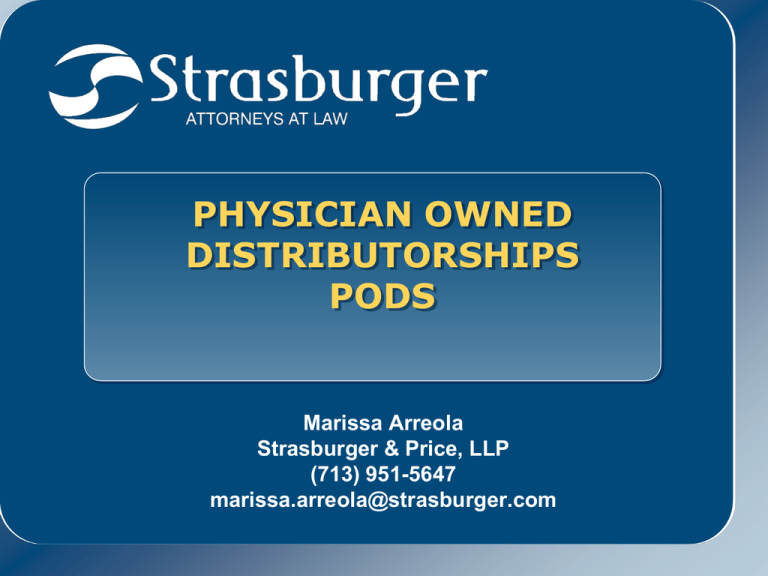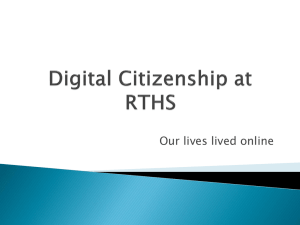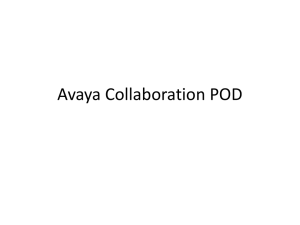Physician-Owned Distributorships
advertisement

PHYSICIAN OWNED DISTRIBUTORSHIPS PODS Marissa Arreola Strasburger & Price, LLP (713) 951-5647 marissa.arreola@strasburger.com Physician-Owned Distributorships Summary of Presentation • Disclaimers • What is a POD? • Are PODs Legal? • What’s Happening with PODs? • Will POD Participants Suffer Legal Consequences? 2 What is a POD? • Entities that derive revenue from selling, or arranging for the sale of, implantable medical devices ordered by their physician-owners for use in procedures the physician-owners perform on their own patients at hospitals or ambulatory surgical centers (“ASCs”). • PODs are one of several types of physician-owned implant companies (POCs). – POCs take several forms, including manufacturers, GPOs, and PODs. • The prevailing POD model is a “stocking distributor” (buys and resells inventory) 3 What is a POD?, cont. • PODs first appeared in California but now are active across the country • PODs reported to be doing business with hospitals in 36 states and the District of Columbia • According to industry rep reports, most hospitals associated with PODs are in California (73), Texas (72), Tennessee (17), Pennsylvania (16), Utah (13), Georgia (12), Louisiana (12) 4 Are PODs Legal? • The Federal Anti-kickback Law prohibits any remuneration to induce physicians to purchase or order (or arrange for purchase or order of) products, or refer patients for a procedure, for which payment may be made under Medicare/Medicaid/Other FHCPs – Orthopaedic/spinal implants used in FHCP patients are deemed paid for in the payment to the hospital or ASC – Remuneration can include a return on investment and the opportunity to earn a profit – Law is violated if one purpose is to induce the prohibited purchase, order or referral, even if there are other legitimate purposes • If only one purpose of giving the physician an investment opportunity is a “referral,” you are solely in the realm of prosecutorial discretion. 5 Are PODs Legal?, cont. • The Stark law prohibits physicians from making Medicare referrals to hospitals if they have a financial relationship absent an exception • The arguably relevant exception is for Indirect Compensation Arrangements – Not available if arrangement violates the AKL – In any event, only allows hospitals to pay physician-owned entity if the payment is FMV and doesn’t vary based on the volume or value of referrals (allows per unit payments) • Query whether a purchase from a POD that adds no value to the implant purchase transaction could meet FMV standards • All AKL/Stark violations actionable under the False Claims Act – Whistleblower enforcement 6 Other Legal Risks with PODs? • Becoming a product supplier carries with it products liability risk and FDA reporting requirements – When physicians become POD owners, they become resellers of implants and are subject to products liability lawsuits. – They also become subject to FDA reporting requirements and fall under FDA jurisdiction for enforcement of adulteration and misbranding violations. • Starting Jan. 1, 2013, all medical device manufacturers whose products are sold in US must register with FDA – Overseas outsourcing will no longer be secret 7 What’s Happening with PODs? • Recent government statements contain warnings – OIG (2006, 2008): PODs “should be closely scrutinized under the fraud and abuse laws” because relationships between manufacturers and physicians “raise the type of risks that [the anti-fraud and abuse] statutes were designed to address.” – CMS (2008): PODs “may serve little purpose other than providing physicians the opportunity to earn economic benefits in exchange for nothing more than ordering medical devices” from their POD. – OIG (2010): “We continue to have serious kickback concerns when companies link investment opportunities to the ability to generate business and offer returns on investment that are disproportionate to business risk.” – Senate Finance Committee (2011): PODs “seem to create financial incentives for physician investors to use those devices that give them the greatest financial return and that, in the process, patient treatment decisions may be based on personal financial gain.” – Tom Scully, Former CMS Administrator (2011): “You can’t possibly think [PODs are] OK. I understand that the docs feel squeezed and want to make more money, but they’re racing towards a cliff. This can’t possibly hold up.” 8 What’s Happening with PODs?, cont. • Some states are taking action – California made self-referral to PODs unlawful in workers’ compensation cases (effective January 1, 2012) – New Hampshire House passed a bill prohibiting PODs in 2012 • Senate did not adopt and the bill was referred for study – Oklahoma adopted a disclosure requirement for PODs in workers’ compensation cases in 2011 • Some hospitals adopting policies prohibiting business with PODs • October 2013 OIG POD study results 9 March 2013 OIG Special Fraud Alert • On March 26, 2013, the Office of Inspector General for the U.S. Department of Health & Human Services (“OIG”) issued its first special fraud alert (“Fraud Alert”) since 2010. This special fraud alert focused on PODs. • The Fraud Alert focuses on four potential areas of concern with PODs – corruption of medical judgment; – Overutilization; – increased costs to the Federal healthcare programs and beneficiaries; and – unfair competition. March 2013 OIG Special Fraud Alert These types of concerns are typically associated with kickback arrangements, and the OIG goes on to say that “[w]e do not believe that disclosure to a patient of the physician’s financial interest in a POD is sufficient to address these concerns.” March 2013 OIG Special Fraud Alert The OIG further stresses its point by listing the following suspect characteristics involving PODs or their physician-owners: • The size of POD investment offered to each physician varies with the expected or actual volume or value of devices used by the physician. • POD distributions are not made in proportion to ownership interest, or physician-owners pay different amounts for their ownership interests in the POD based on the expected or actual volume or value of devices used by the physicians. • Physician-owners condition their referrals to hospitals or ASCs on the facilities’ purchase of POD devices. • Physician-owners are required, pressured, or actively encouraged to refer, recommend, or arrange for the purchase of the devices sold by the POD or, conversely, are threatened with, or experience, negative repercussions (e.g., decreased distributions, required divestiture) for failing to use POD devices for their patients. March 2013 OIG Special Fraud Alert • The POD retains the right to repurchase a physician-owner’s interest for the physician’s failure or inability to refer, recommend, or arrange for the purchase of POD devices. • The POD is a shell entity that does not conduct appropriate product evaluations, maintain or manage sufficient inventory in its own facility, or employ or otherwise contract with necessary operational personnel. • The POD does not maintain continuous oversight of all distribution functions, and when a hospital or ASC requires physicians to disclose conflicts of interest, the physician-owners either fail to inform the hospital or ASC of their ownership interest in the POD or actively conceal their ownership through misrepresentation. March 2013 OIG Special Fraud Alert • Avoiding these areas of concern will minimize the risk of violating fraud and abuse laws, but it will not eliminate this risk. Similarly, failing to avoid these areas of concern does not guarantee that the OIG will determine that a fraud and abuse violation occurred. • Physicians should work with experienced healthcare attorneys when structuring new POD entities or evaluating existing PODs for fraud and abuse risks. OIG POD STUDY October 2013 • The report responds to a congressional request to determine the extent to which PODs provide spinal devices to hospitals. • Study notes that POD advocates claim that their devices cost less than devices provided by other spinal device companies. • Critics of PODs claims that physician ownership creates a conflict of interests that may affect physicians’ clinical decision making. OIG POD STUDY October 2013 • In FY 2011 PODs supplied devices used in nearly 20%of spinal fusion surgeries billed to Medicare. • Spinal surgeries that used POD devices used fewer devices but did not have lower per surgery device costs than surgeries that did not use POD devices OIG POD STUDY October 2013 • When hospitals in the study began buying from PODs, their rates of spinal surgery grew faster than the rate for hospitals overall. • In FY2012, surgeons performed more spinal surgeries at hospitals with POD devices than those without POD devices. • Of the nationwide respondents to the OIG study, Texas had the third largest number of spinal surgeries and the 2nd highest number of cases using POD devices (California was highest). Texas’ percentage of surgeries using POD devices was 29%. OIG POD STUDY October 2013 Conclusions • PODs are a substantial presence in the spinal device market. • The OIG questions whether POD devices do cost less than those of other suppliers. • More spinal surgeries are performed at facilities that purchase from PODs. • Not all physicians to disclose POD ownership to the hospital or patient. • These conclusions reduce the ability for hospitals and patients to identify conflicts of interest amongst POD owning providers. Will POD Participants Suffer Legal Consequences: • Unfortunately, it’s impossible to predict • OIG, DOJ, State Attorney General, or qui tam relator could bring a case at any time – History of federal government action related to physician ownership has been to gradually shut down passive ownership opportunities • In the early ‘90s, DOJ shut down physician-owned imaging and respiratory therapy companies under the AKL • In the mid ‘90s, Stark law prohibited self referral for labs, imaging, DME, hospitals, with certain exceptions • 2010 OIG shut down a physician-owned lithotripsy/laser business under AKL • PODs offer little to deter enforcement Mitigating Risk • Disclose POD ownership to facility and patient • Consider excluding government payor patients from POD procedures, if clinically appropriate • Structure POD company in accordance with fraud and abuse laws and regulations for physician owned entities • Structure arrangement between POD and facility such that the compensation complies with current fraud and abuse regulations THANK YOU! Marissa Arreola Strasburger & Price LLP (713) 951-5647 marissa.arreola@strasburger.com 22






